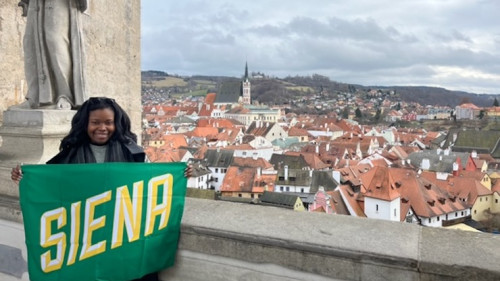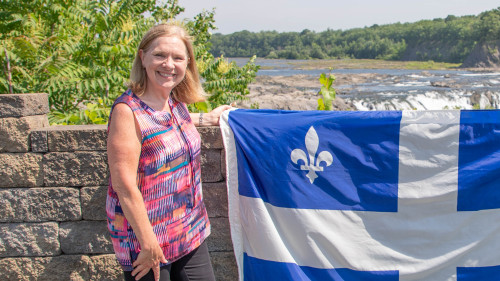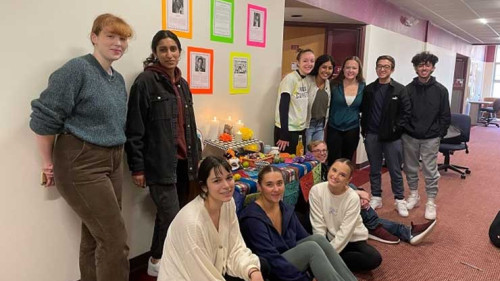
When their course trip to Spain was cancelled, the students took to…their kitchens?
Marcela Garcés, Ph.D., associate professor of Spanish, taught “Culture Through Cuisine: Exploring the Basque Region in Northern Spain” this semester. She and her 10 students were set to head to Basque Country on May 18, to immerse themselves for several days in the land, language and food they had been studying.
When the pandemic shutdown derailed those plans, Garcés decided to assign an “un-paper,” where the class would cook or bake Basque recipes from scratch in their home kitchens, try their hand at food photography, and post about it (en español, por supuesto) online.
Garcés gave them pointers about composition and lighting to show off their dishes to best advantage and possibly inspire their fellow chefs. Coincidentally, all of the students chose to make desserts.
Drew Califano ’21 baked torrijas, a dish commonly eaten in Spain during the Easter season and consisting primarily of bread, cinnamon, sugar, and milk.
“It surprised me how much they differed from breakfast foods common in the United States. They were much more smooth and delicate than dishes such as French toast, despite their similar appearance. I believe that this activity has provided me with a new perspective on cooking, demonstrating that creating artful and appetizing cuisine entails more effort than one may initially think. I will be sure to cook this delicious meal in the future."
Alexander Babbie ’22 chose Basque-style rice pudding, and had such success with it he made it a second time – and a third.
“I chose this recipe because, for one, I love rice pudding, and two, we were quarantined at home and I had the ingredients on hand. My family loved it, they asked me to make it again.”
Babbie said he always appreciates being able to learn about lives – and cuisine - from around the world.
“Dra. Garcés helped all of us get a window into a new world. Truth be told, I've thought about moving to el País Vasco so that I can dive a little deeper into the culture, something I never would have considered without taking this course.”
One of the highlights of the trip to Spain was to have been a dinner in a txoko, a members-only gastronomic society, which are a key part of Basque life.
“They enjoy food and wine at a slower pace there. Conversation and camaraderie are as important as the meal.”
Jess Livingston ’21 acknowledged that she and her classmates were disappointed about the cancellation of their trip to Spain.
“Transitioning to online learning was difficult at first, but Dra. Garcés had ensured that we could still get the most out of this course; so, upon receiving the final project, I knew that I had not only wanted to demonstrate my knowledge, but my gratitude, as well. Overall, she not only taught me about the richness in Basque food, but also in its unique culture, and I really wanted to emulate that through my goxua.” (Goxua is a Basque word meaning “sweet.”)
Garcés said she was glad the students got to experience for themselves the “slow food” movement that is a hallmark of Basque culture.
“Making your own food and sharing it with people you care about is part of what makes this movement so special. They were able to connect with their families through their cooking, and I hope they can continue with it in the future.”
Interested in trying some Basque cooking yourself? The class got recipes from Marti Buckley's blog Blank Palate. Buckley is a chef and the author of the cookbook “Basque Country.” She was featured in the documentary “The Txoko Experience” (2017), a joint project by Garcés and her husband, filmmaker Yuri Morejón, who is originally from the Basque Country.
SpanishAtSiena on Instagram has more photos of the students’ recipe results.

